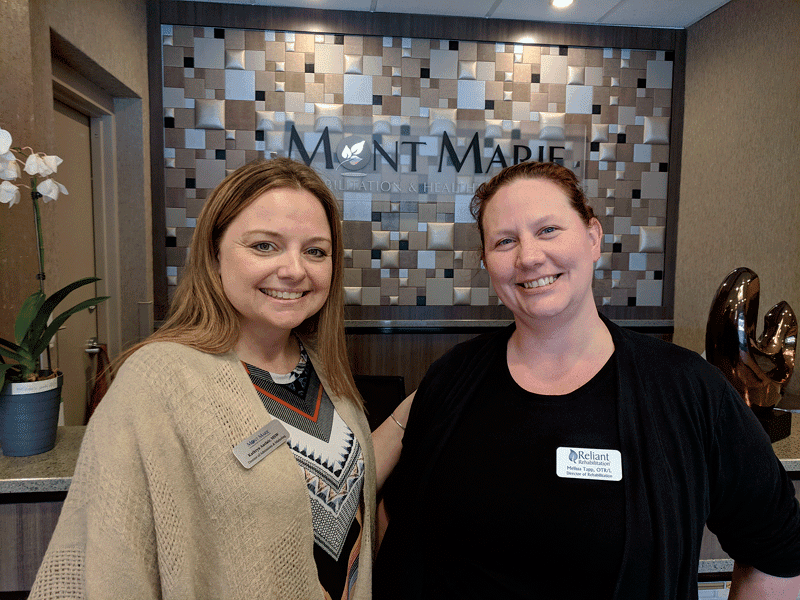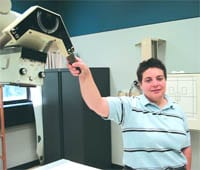Recovery Time – Mont Marie Evolves to Meet Changing Rehab Needs

Melissa Tapp understands the shift happening among older Americans. Specifically, that there are more of them, and their needs are changing.
“With so many people aging, and a lot more people wanting to age in place, things like falls can happen, and people wind up in the hospital. Or they get sick and there are complications, and when they come here, they’re fairly ill.”
That’s why Tapp, director of rehabilitation at Mont Marie Rehabilitation & Healthcare Center in Holyoke, appreciates the $1 million renovation, completed a little over a year ago, of the facility’s short-term rehab wing.
In all, Mont Marie features 84 beds and a mix of long-term care and short-term rehab for patients recovering from a range of illnesses, injuries, and medical procedures, from pneumonia and chronic obstructive pulmonary disease to knee and hip replacements. “It pretty much runs the whole gamut,” Tapp said.
The facility has come a long way since its campus on Lower Westfield Road, formerly owned and operated by the Congregation of the Sisters of St. Joseph, was purchased in 2014 by New Jersey-based Tryko Partners and put under the management of its healthcare subsidiary, Marquis Health Services.
The sale involved a complex that included what was known then as Mont Marie Health Care Center, the management of two rental housing facilities — the Mont Marie Senior Residence and St. Joseph Residence, which together house 80 age-restricted, HUD-supported units — as well as a former school building, with gymnasium space, and the congregation’s retirement and office quarters.
Today, in the wake of the extensive renovation — which took about a year to complete and includes 26 updated patient rooms, 20 of them, private, and an expanded therapy gym — specialized services at Mont Marie include subacute care, orthopedic rehab, stroke recovery, cardiac care, wound care, 24/7 skilled nursing, hospice care, pain management, respiratory therapy, and dental, optometry, and audiology services.
“We provide physical, occupational, and speech therapy. There’s a dietitian on board, as well as a respiratory therapist,” said Kathryn Auclair, director of admissions and marketing, adding that patients are referred from a number of sources, from their own families to area hospitals.
And the expanded focus on short-term rehabilitation has proven to be a game changer. Sarah Stone, director of regional admissions and marketing, noted that, on the day Marquis took over the building, it had 84 residents, but only one in for short-term rehab. Today, all 26 short-term rehab beds are filled.
“It used to be more long-term care, and there was no turnover,” Auclair told HCN. “Now, the subacute rehab averages 30 admission a month, and the same for discharges.”
Stretching Out
Indeed, the evolution of Mont Marie’s rehab facility is a response to the growing, and more acute, needs among the senior population, Auclair said. “Back when the sisters owned it, it was rest-home level, per se, but the acuity here is much higher now that Marquis owns it. That’s why we did the renovation to the rehab unit.”
The rehab renovation completely transformed the first floor, she added, while further plans for the second floor will be announced in the coming months.
“We updated all the rooms and bathrooms, so they’re suite-like,” she said, “and we have electronic documentation rather than being tied to pen and paper.”
In an era when senior-care facilities of all kinds are emphasizing resident-centric care, Mont Marie offers a suite of amenities aimed at making patients and families more comfortable, Stone said, including full dining services, landscaped outdoor patios, bright lounges, flatscreen TVs in the rooms, wi-fi and cable, recreational activities, local outings, and on-site pastoral care and access to the facility’s historic chapel, which hosts a daily Mass.
“It’s really important that we’re providing a level of care and compassion to both residents and their families, so we offer meals and transportation vouchers, and we invite family members to be here as frequently as they want. There are no restrictions on visiting.”
“That’s great for families and residents,” Auclair added.
But most important, Stone said, is the rehabilitation care itself. When HCN visited, several short-term residents were in the gym, working with therapists and gym equipment to make progress toward recovery.
“We offer therapy seven days a week, and we’re able to provide the same level and intensity of rehabilitation as an acute level, but we’re not held to those guidelines because we are a subacute facility,” she explained. “In layman’s terms, we can do up to three hours of therapy a day, but if the patient can’t tolerate three hours of therapy a day, we provide whatever level therapy they can handle. We can tailor the therapy to their needs.”
In addition to the rehab center, skilled nursing, and two independent-living facilities on campus, Mont Marie offers a range of care levels along the continuum — it lacks only assisted living — that many facilities aim for, and it’s not done.
“We’re working on making it a medical-home model,” Stone said, referring to a philosophy, becoming dominant in American healthcare, that stresses patient-centered, coordinated, comprehensive care in one location. “We have big plans for the future of the campus.”


Comments are closed.